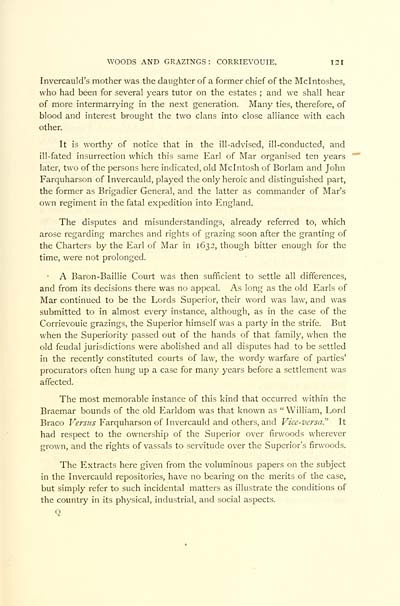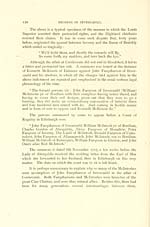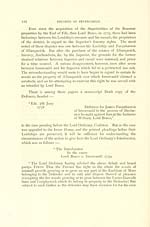Download files
Complete book:
Individual page:
Thumbnail gallery: Grid view | List view

WOODS AND GRAZINGS: CORRIEVOUIE. 121
Invercauld's mother was the daughter of a former chief of the Mclntoshes,
who had been for several years tutor on the estates ; and we shall hear
of more intermarrying in the next generation. Many ties, therefore, of
blood and interest brought the two clans into close alliance with each
other.
It is worthy of notice that in the ill-advised, ill-conducted, and
ill-fated insurrection which this same Earl of Mar organised ten years
later, two of the persons here indicated, old Mcintosh of Borlam and John
Farquharson of Invercauld, played the only heroic and distinguished part,
the former as Brigadier General, and the latter as commander of Mar's
own regiment in the fatal expedition into England.
The disputes and misunderstandings, already referred to, which
arose regarding marches and rights of grazing soon after the granting of
the Charters by the Earl of Mar in 1632, though bitter enough for the
time, were not prolonged.
■ A Baron-Baillie Court was then sufficient to settle all differences,
and from its decisions there was no appeal. As long as the old Earls of
Mar continued to be the Lords Superior, their word was law, and was
submitted to in almost every instance, although, as in the case of the
Corrievouie grazings, the Superior himself was a party in the strife. But
when the Superiority passed out of the hands of that family, when the
old feudal jurisdictions were abolished and all disputes had to be settled
in the recently constituted courts of law, the wordy warfare of parties'
procurators often hung up a case for many years before a settlement was
affected.
The most memorable instance of this kind that occurred within the
Braemar bounds of the old Earldom was that known as " William, Lord
Braco Versus Farquharson of Invercauld and others, and Vice-versa." It
had respect to the ownership of the Superior over firwoods wherever
grown, and the rights of vassals to servitude over the Superior's firwoods.
The Extracts here given from the voluminous papers on the subject
in the Invercauld repositories, have no bearing on the merits of the case,
but simply refer to such incidental matters as illustrate the conditions of
the country in its physical, industrial, and social aspects.
Q
Invercauld's mother was the daughter of a former chief of the Mclntoshes,
who had been for several years tutor on the estates ; and we shall hear
of more intermarrying in the next generation. Many ties, therefore, of
blood and interest brought the two clans into close alliance with each
other.
It is worthy of notice that in the ill-advised, ill-conducted, and
ill-fated insurrection which this same Earl of Mar organised ten years
later, two of the persons here indicated, old Mcintosh of Borlam and John
Farquharson of Invercauld, played the only heroic and distinguished part,
the former as Brigadier General, and the latter as commander of Mar's
own regiment in the fatal expedition into England.
The disputes and misunderstandings, already referred to, which
arose regarding marches and rights of grazing soon after the granting of
the Charters by the Earl of Mar in 1632, though bitter enough for the
time, were not prolonged.
■ A Baron-Baillie Court was then sufficient to settle all differences,
and from its decisions there was no appeal. As long as the old Earls of
Mar continued to be the Lords Superior, their word was law, and was
submitted to in almost every instance, although, as in the case of the
Corrievouie grazings, the Superior himself was a party in the strife. But
when the Superiority passed out of the hands of that family, when the
old feudal jurisdictions were abolished and all disputes had to be settled
in the recently constituted courts of law, the wordy warfare of parties'
procurators often hung up a case for many years before a settlement was
affected.
The most memorable instance of this kind that occurred within the
Braemar bounds of the old Earldom was that known as " William, Lord
Braco Versus Farquharson of Invercauld and others, and Vice-versa." It
had respect to the ownership of the Superior over firwoods wherever
grown, and the rights of vassals to servitude over the Superior's firwoods.
The Extracts here given from the voluminous papers on the subject
in the Invercauld repositories, have no bearing on the merits of the case,
but simply refer to such incidental matters as illustrate the conditions of
the country in its physical, industrial, and social aspects.
Q
Set display mode to: Large image | Transcription
Images and transcriptions on this page, including medium image downloads, may be used under the Creative Commons Attribution 4.0 International Licence unless otherwise stated. ![]()
| Publications by Scottish clubs > New Spalding Club > Records of Invercauld MDXLVII - MDCCCXXVIII [1547- 1828] > (149) Page 121 |
|---|
| Permanent URL | https://digital.nls.uk/81583656 |
|---|
| Description | Volumes 47-53 are uniform with but not part of the club's series. |
|---|---|

